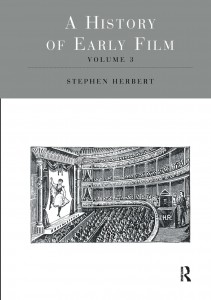A History of Early Film Volume 3
(livre en anglais)
Sous la direction de Stephen Herbert


Moyenne des votes : ![]()
| 0 | vote | |
| 0 | vote | |
| 0 | vote | |
| 0 | vote |
Votre vote : -
Description de l'ouvrage :
Volume 3 of A History of Early Film examines critical responses to early cinema, including the impassioned thoughts of one of the first film critics, the American poet Vachel Lindsay and considers some contemporary judgements of the social aspects of moving pictures. The volume also includes the 1917 report The Cinema: Its Present Position and Future Possibilities...which provides a unique record of the attitudes towards the cinema by its British audiences exhibitors, producers, guardians of morality and those responsible for licensing.
À propos de l'auteur :
Stephen Herbert trained as a media technician, and spent many years in film exhibition and production. His interest in the origins of the moving image led to Stephen co-editing the influential book and website Who’s Who of Victorian Cinema, and contributions to academic journals. He ran the small press The Projection Box, and has recently retired as a freelance museum consultant.
Voir le site internet de l'éditeur Routledge
> Du même auteur :
A History of Early Film Volume 2 (2023)
An Established Industry
Dir. Stephen Herbert
Sujet : Cinéma muet
> Sur un thème proche :
Menus for Movieland (2015)
Newspapers and the Emergence of American Film Culture 1913-1916
de Richard Abel
Sujet : Cinéma muet
Early American Cinema in Transition (2001)
Story, Style, and Filmmaking, 1907-1913
de Charlie Keil
Sujet : Cinéma muet
The History of the British Film 1914 - 1918 (2011)
Volume III
Dir. Rachael Low
Sujet : Pays > Grande-Bretagne
The Image in Early Cinema (2018)
Form and Material
de Scott Curtis, Tom Gunning, Philippe Gauthier et Joshua Yumibe
Sujet : Cinéma muet
Studios Before the System (2015)
Architecture, Technology, and the Emergence of Cinematic Space
Sujet : Cinéma muet
Early Cinema Today (2012)
The Art of Programming and Live Performance
Dir. Martin Loiperdinger
Sujet : Cinéma muet